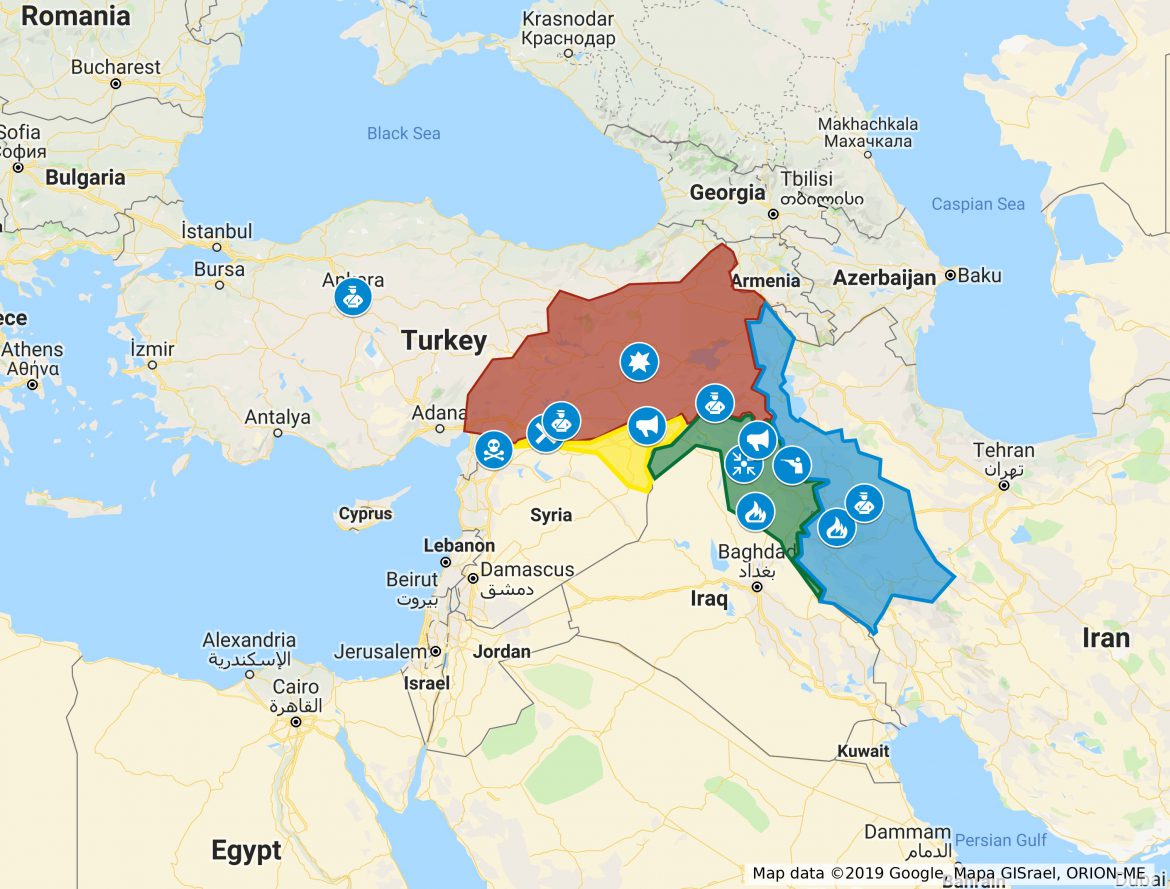Iran
- Last week, Iranian security forces killed three Kurdish border porters (Kolbars) and wounded four. Iranian border guards wounded two Kolbars near Sardasht. On Wednesday, an Iranian ambush killed one Kolbar and injured another near Nowdeshah. On Thursday, a Kolbar from Piranshahr named Younis Alton succumbed to injuries suffered at the hands of Iranian border guards four days ago. On Saturday, another Kolbar was killed in the vicinity of the Kanizada border crossing near Sardasht. Since the beginning of 2019, the Iranian regime has killed 43 Kolbars and injured 79.
- On Saturday, around 250 acres of forest and farmland were burned following a suspected arson attack in Ravansar. According to the Kurdistan Human Rights Association (KMMK), the fire also injured three Kurds.
- In Dehgolan, Iranian intelligence officers (Ettela’at) arrested a Kurdish man named Mohammed Karawnan for “connection with a Kurdish opposition party.” No further information was released by Iranian authorities regarding Karawnan’s arrest or detention.
Iraq
- Kurdistan’s Prime Minister-elect, Mansour Barzani, presented the names of his new cabinet to the Parliament of Kurdistan to be voted upon. The new Kurdistan Regional Government (KRG) is formed primarily from the three winners of the September 2018 elections, which are the Democratic Party of Kurdistan (KDP), the Patriotic Union of Kurdistan (PUK), and the Movement for Change (Gorran). The Parliament is set to vote on the new cabinet members this week. The PUK also finalized its candidate for the post of Speaker of Parliament, Rewaz Faiq. The new cabinet includes three female ministers. The names of the new KRG officials are:
(KDP) Masrour Barzani, Prime Minister
(KDP)Firsat Ahmed Abdulla, Minister of Justice
(KDP) Reber Ahmed, Minister of Interior
(KDP) Saman Barzinji, Minister of Health
(KDP) Alan Hama Saeed, Minister of Education
(KDP) Sasan Auni, Minister of Municipalities and Tourism
(KDP) Pshtiwan Sadiq, Minister of Religious Affairs
(KDP) Kamal Mohammed Salih, Minister of Electricity
(KDP) Vala Fared, Region Minister
(KDP) Safeen Dizayee, Department of Foreign Relations
(PUK) Qubad Talabani, Deputy Prime Minister
(PUK) Shorish Ismael, Minister of Peshmerga
(PUK) Aram Mohammed, Minister of Higher Education
(PUK) Dara Rashid, Minister of Planning
(PUK) Begard Talabani, Minister of Agriculture and Water Resources
(PUK) Mohammed Saed Ali, Minister of Youth and Culture
(PUK) Khalid Salam Saeed, Region Minister
(Gorran) Awat Sheikh Janab, Minister of Finance and Economy
(Gorran) Dana Abdulkarim, Minister of Construction and Housing
(Gorran) Kwestan Mohammed, Minister of Labor and Social Affairs
(Gorran) Kamal Muslim, Minister of Trade and Industry
(KSDP)Abdulla Mahmood, Minister of Martyrs and Anfal Affairs
(Christian) Ano Jawhar, Minister of Communication and Transportation
(Turkmen list) Aydin Maruf, Region Minister
Presidency:
(KDP) Nichervan Barzani, President
(Gorran) Mustafa Said Qadir, Vice President
(PUK) Jafaar Sheikh Mustafa, Second Vice President
- The Parliament of Kurdistan denounced the continuing Turkish military incursion into Iraqi Kurdistan and demanded the federal government of Iraq intervene because it is “their responsibility according to the Constitution of Iraq.” This followed additional Turkish air and artillery strikes which caused civilian casualties in the region last week. The Turkish military campaign was launched in May to target the headquarters of the Kurdistan Workers’ Party (PKK) but has killed six Kurdish civilians since then and dozens more since 2015. The PKK also confirmed a Turkish airstrike killed a senior commander and two of his associates on June 27.
- In Kirkuk province, Kurdish villagers accused Iraqi federal police of burning their homes near the Daquq District. Five Kurdish houses were burned down without any statement or clarification from Iraqi authorities. On October 16, 2017, Iraqi government forces and Iranian-backed militias seized control of Kirkuk and removed Kurdish forces from the province.
Syria
- Germany rejected an American request to deploy ground troops in northeastern Syria. The U.S. Special Representative for Syria Engagement and Special Envoy for the Global Coalition to Defeat ISIS, James Jeffrey, told German media that he wants Berlin to send troops to “partly replace” withdrawing American forces. On Monday, however, a German government spokesman stated a deployment of ground troops “was out of the question.” The German military currently provides reconnaissance assets, infantry training, and other external support to Syria.
- The Syria Observatory for Human Rights (SOHR) released a report offering further insight into atrocities committed by Turkish-backed jihadi groups in Afrin. The report claims Kurdish homes have been converted into military headquarters for jihadi factions and that Kurds have been forced to pay various “taxes” for having relatives in U.S.-backed Kurdish units fighting ISIS (Da’esh). Meanwhile, jihadi organizations have again engaged in internal fighting to consolidate political power and gain control of criminal enterprises in the region. Afrin was occupied by Turkey and various jihadi groups on March 18, 2018.
- On Monday, the Rojava Center for Strategic Studies concluded a three-day symposium on Da’esh in Qamishli titled “The International Forum on ISIS: Dimensions, Challenges, and Strategies of Confrontation.” The conference featured testimony from victims of Da’esh’s brutality, lectures by internationally-renowned academics and lawyers, and presentations from members of the Syrian Democratic Forces’ leadership.
Turkey
- On Friday, Turkish police launched a new wave of arrests and detained eight Kurds in the Beytüşşebap District of Sirnak province. On Saturday, Turkish authorities raided the homes of two members of the pro-Kurdish Peoples’ Democratic Party (HDP) in Ankara. On Monday, three HDP members were arrested in Urfa. Concurrently, Turkish military forces continued with operations in the Kurdish region, deploying troops in the Lice and Kulp districts of Diyarbakir. Last week, Cemil Bayik, a founding member of the PKK, published an op-ed in the Washington Post calling for a renewal of peace between the Kurds and Turkish government. On Monday, a group of Kurdish activists and HDP members held a “peace march” in Diyarbakir whose official slogans included “peace instead of war,” “democracy instead of injustice,” and “Kurds say that solving the Kurdish question will help Turkey’s democratization.”

